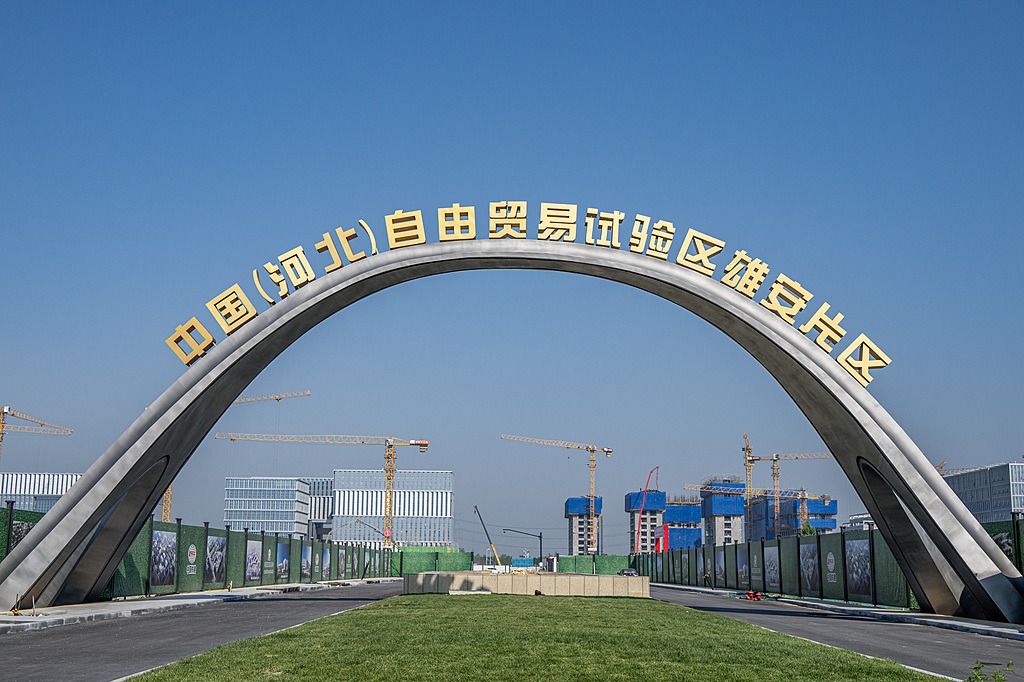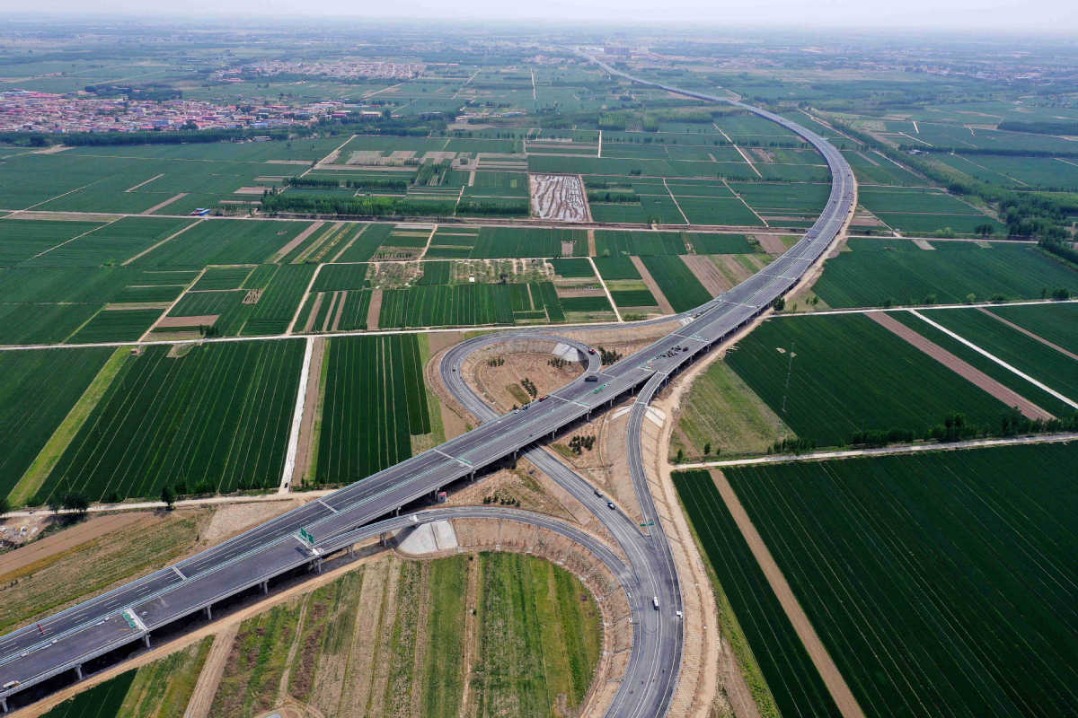Development shift
An inclusive and coordinated governance system is urgently needed for the global community


Established at the Bretton Woods Conference in 1944, the World Bank has served as a key institution for global development financing. For nearly 80 years, the United States has maintained decisive influence over its operations. However, this governance structure now faces fundamental challenges.
During his first term as US president, Donald Trump rejected the World Bank's request for additional capital on the grounds of efficiency concerns and criticized it for extending loans to emerging economies such as China. Now in his second term, Trump has explicitly distanced the US from international development affairs, shutting down the US Agency for International Development, leading scholars to speculate on the possibility of the US withdrawing from the World Bank. The policy shift is rooted in deep structural transformations. On the international level, the collective rise of the Global South is reshaping global governance, continuingly weakening US dominance over the multilateral financial order and leading to a decline in the US' influence within the World Bank.
At the same time, the global development financing system has evolved beyond the institutional framework of Bretton Woods. The emergence of diversified funding sources and innovative financing tools has significantly diminished the World Bank's leverage over policy reforms in developing countries, and directly curtailed the US' capability in wielding its international influence through the institutional leverage.
A more profound driver is the domestic political changes in the US, which have led to a systemic disengagement from multilateral development cooperation. In the beginning of 2025, the Trump administration has worked on shutting down the USAID.As a key tool of US development diplomacy, the USAID has played an irreplaceable role in advancing political agendas, maintaining geopolitical advantages, and safeguarding US political, economic and military interests. The announcement of the closing of the USAID sparked strong reactions from US think tanks. Mainstream institutions such as the Brookings Institution have warned that cutting the USAID would severely damage the US' soft power projection. However, it is worth noting that the discussion around the agency's closure has largely focused on power politics dynamics, with much less attention given to its negative impact on global development governance. In fact, from cutting the USAID to the potential withdrawal from the World Bank, Trump's decisions have not been impulsive. A 2021 survey by the Chicago Council on Global Affairs showed that US citizens overwhelmingly prioritize domestic issues over international influence, with 81 percent of respondents more concerned about domestic challenges and only 19 percent focusing on external threats. This inward-looking sentiment provides a strong public foundation for Trump's "America First" policy.
From the perspective of comparative politics, using development aid to serve diplomatic strategy is not unprecedented. For instance, the United Kingdom merged its Department for International Development and the Foreign Office in 2020. However, if the US should withdraw from the World Bank, the repercussions would be far more profound. At a time of worsening global governance deficit and international trust crises, the major power abandoning its multilateral responsibilities could trigger a chain reaction, jeopardizing the collective action needed to address transnational challenges such as climate change and public health. Such a unilateral retreat would not only violate the ethics for global development but also undermine the international cooperation needed to mitigate systemic risks.
In the case of the US insisting on withdrawing from the World Bank, even if a future administration decided to rejoin, the policy reversals would have lasting short- and long-term impacts, directly shaking the global system for development governance.
First, there would be a structural funding shortage. As the world's largest bilateral aid provider and the largest shareholder of the World Bank, the US' departure would create a new financial bottleneck at a time when development financing is already under strain, despite the fact that the shock could be partially offset by the current diversified global development financing landscape, including foreign direct investment, international capital market financing, philanthropic donations, nongovernmental organization funding and innovative financial instruments.
Second, the World Bank's governance structure would need to be restructured. Since the agency's establishment, the World Bank president has always been an American. The change of this tradition would not only raise procedural issues related to leadership transitions but also fundamental shifts in the organization's development philosophies and decision-making mechanisms.
Finally, if the US were to reduce its contributions or no longer gives its political support to the World Bank, the bank's credit rating could face long-term risks. Moreover, the negotiations about its equity structure adjustments would become even more complex and difficult. It would require existing member states to reach a new consensus on capital contributions, voting rights distribution and other issues, a process that could involve prolonged negotiations.
Deeper challenges would lie in the structural reshaping of the global development governance system. If the US withdraws from the World Bank, it would become imperative to construct a new cooperation framework among multilateral institutions and third-party leading players. Such institutional reconstruction would not only involve the arrangement of emergency funding, but would also necessitate profound transformations of the international development system in three areas.
First, as development financing becomes increasingly diverse, an effective mechanism of coordinated governance is urgently needed. Key structural challenges include the efficiency losses caused by fragmented funding sources, a "race to the bottom" driven by differentiated aid conditions, and the lack of reform incentives for recipient countries. These structural dilemmas make traditional aid-driven development models less effective in generating momentum for sustainable development.
Second, amid a global economic slowdown, development financing must shift from quantity to improvement in quality. This requires international financial institutions to draw on productive financing models and enhance the multiplier effect of funding utilization.
Third, traditional poverty-reducing models have proved to be increasingly inadequate in addressing new, complex challenges, such as climate change, technological disruptions and global supply chain restructuring. To avoid using outdated approaches in a rapidly changing world, international development institutions need to shift from focusing on single-dimensional economic indicators to developing holistic resilience-building approaches, and from applying standardized solutions to designing differentiated strategies.
The dilemma faced by the World Bank is not an isolated case but rather a reflection of the broader decline of the global governance system. The United Nations' ineffectiveness in conflict mediation, the World Trade Organization's ineffectiveness in resolving trade disputes, and other similar issues all point to the systemic challenges posed to the post-World War II global governance framework.
The weak global governance is characterized by key features. First, escalation of geopolitical conflicts and the rising uncertainties that are driving a restructuring of global value chains. Regional governance may replace the traditional "homogeneous" global governance model to play a bigger role in the new structures.
Second, agenda-based club-style governance models may partially replace the functions of traditional international institutions. During the transition, it is essential to reconstruct institutional frameworks to enhance the voice of developing countries in agenda setting, the formulation of standards and resources allocation. At the same time, priorities need to be given to specific regional and national development needs rather than methodologies, ensuring that development strategies align with local realities.
Third, it's advisable to guard against risks from governance fragmentation. If multilateralism gives way to regional bloc rivalries, collective action to tackle transnational challenges such as climate change and public health will be hampered.
Experiences have shown that global development has never been a zero-sum game. In an era of deepening technological revolutions and intensifying climate crises, the international community needs an inclusive and coordinated governance system more than ever. The reform of the World Bank should be the start of a new order for the global development community to create a future of shared prosperity in an increasingly turbulent world.

The author is a professor at the School of International Politics and Economics at the University of the Chinese Academy of Social Sciences and director of the Research Center for Development at the Institute of World Economics and Politics at the Chinese Academy of Social Sciences. The author contributed this article to China Watch, a think tank powered by China Daily. The views do not necessarily reflect those of China Daily.
Contact the editor at editor@chinawatch.cn.


































